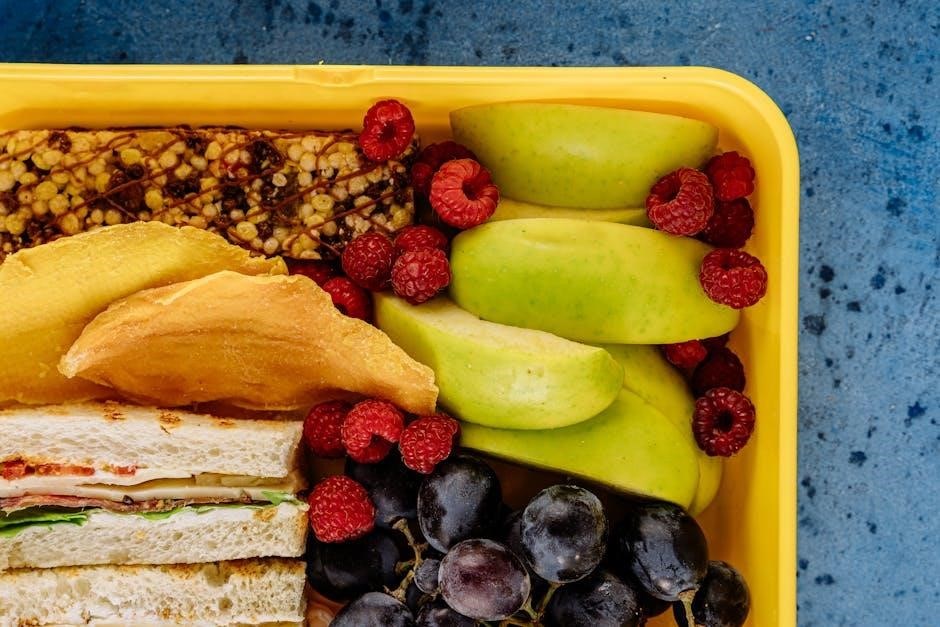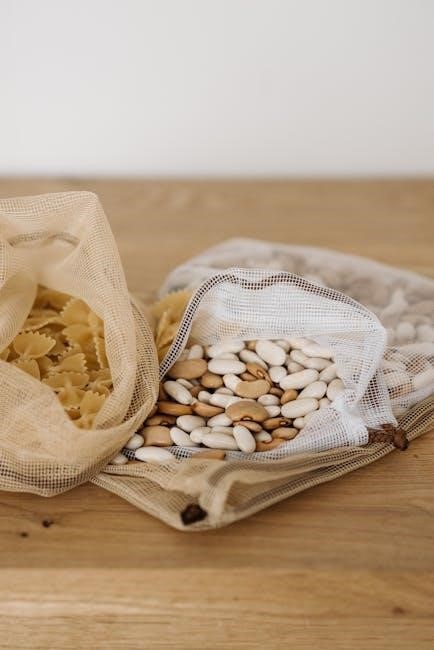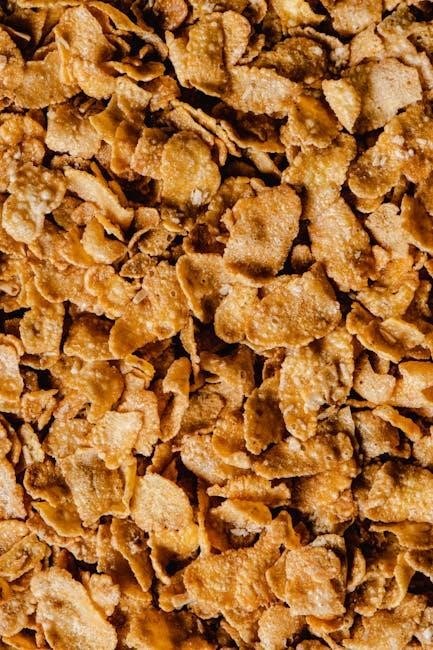A bulking meal plan is a structured approach to gaining muscle mass through strategic eating․ It focuses on protein, carbs, and fats to create a calorie surplus, ensuring steady muscle growth and recovery․
What is a Bulking Meal Plan?
A bulking meal plan is a detailed dietary strategy designed to help individuals gain muscle mass by consuming a calorie-surplus diet․ It typically includes 5-6 meals per day, such as breakfast, snacks, lunch, dinner, and a pre-bed snack, ensuring a steady supply of nutrients for muscle growth and recovery․ The plan focuses on balancing macronutrients—protein, carbohydrates, and fats—to meet specific daily targets, often around 3,000-4,500 calories depending on individual needs․ By prioritizing nutrient-dense foods and timing meals strategically, a bulking meal plan aims to maximize muscle gain while minimizing fat storage, providing a structured approach for those looking to build lean muscle effectively․
Importance of a Structured Meal Plan for Bulking
A structured meal plan is crucial for bulking as it ensures a consistent calorie surplus, essential for muscle growth․ By organizing meals around protein, carbs, and fats, it promotes steady muscle gain and recovery․ A well-planned diet helps avoid excessive fat storage, keeping the focus on lean muscle development․ It also prevents nutrient deficiencies and supports training performance․ For example, a 3,400-calorie plan with 213g of protein, 468g of carbs, and 76g of fat provides the necessary fuel for growth․ Without structure, it’s easy to under-eat or overeat, hindering progress․ A structured plan offers clarity and accountability, making the bulking process more efficient and sustainable․
Key Components of a Successful Bulking Strategy
A successful bulking strategy revolves around a calorie surplus, macronutrient balance, and consistent meal frequency․ Prioritizing protein intake ensures muscle repair and growth, while carbohydrates provide energy for workouts․ Healthy fats support hormone production․ Meal plans should include 5-6 meals, such as pre-workout snacks, post-workout breakfasts, lunch, dinner, and a pre-bed snack․ Staying hydrated and tracking progress are also vital․ For example, a 3,400-calorie plan with 213g of protein, 468g of carbs, and 76g of fat ensures adequate fuel for muscle growth․ Consistency in following the plan and adjusting based on progress guarantees optimal results and minimizes fat gain, keeping the focus on lean muscle development․

Understanding Caloric Intake for Bulking
Understanding caloric intake for bulking involves consuming a surplus to fuel muscle growth and recovery, typically exceeding maintenance levels by 250-500 calories daily․
Calculating Daily Caloric Needs
Calculating daily caloric needs for bulking involves determining your maintenance calories and adding a surplus․ Start with your basal metabolic rate (BMR), then multiply by an activity factor (e․g․, 1․6 for sedentary, 2․2 for active)․ Add 250-500 calories to create a surplus for muscle growth․ For example, a 190-210 pound man might aim for 3,400 calories daily, with 213g of protein, 468g of carbs, and 76g of fat․ Adjust based on progress, ensuring steady weight gain of 0;5-1 pound weekly․ Tracking tools or a nutritionist can help refine calculations for individual needs․
Role of Caloric Surplus in Muscle Growth
A caloric surplus is essential for muscle growth, as it provides the energy needed for muscle repair and hypertrophy․ When you consume more calories than you burn, your body uses the excess to build and strengthen muscle tissue․ Aim for a moderate surplus (250-500 calories above maintenance) to avoid excessive fat gain․ For example, a 190-210 pound man might target 3,400 calories daily, with a balance of protein, carbs, and fats․ This surplus supports protein synthesis and recovery, enabling steady muscle growth․ Consistency in maintaining this surplus is key to achieving bulking goals effectively․
Adjusting Caloric Intake Based on Progress
Regularly assessing your weight and progress is crucial for bulking․ If muscle gain is too slow, increase your caloric intake by 5-10% monthly․ Conversely, if fat gain exceeds muscle growth, reduce calories by 5%․ Monitor protein intake to ensure it aligns with muscle-building goals․ Adjustments should be gradual, allowing time to observe changes․ For example, a 190-210 pound man might start with 3,400 calories and tweak based on progress․ Consistency and patience are key, as muscle growth takes time․ Adjustments depend on individual factors like metabolism and activity levels, ensuring a balanced approach to bulking effectively․

Macronutrient Breakdown for Bulking
A successful bulking diet balances protein, carbs, and fats․ Protein supports muscle repair, carbs provide energy, and fats aid hormone production․ Aim for a ratio tailored to your goals and activity level․
Protein Requirements for Muscle Growth
Protein is essential for muscle repair and growth during bulking․ Aim for 1․6-2․2g of protein per kilogram of body weight daily․ High-protein foods like chicken, fish, and eggs are ideal․ Include protein in every meal to maintain a positive nitrogen balance, supporting muscle synthesis․ For a 190-210 pound individual, 191-213g of protein per day is recommended․ Spread protein intake evenly across 5-6 meals to optimize absorption and muscle recovery․ This ensures your body has the necessary building blocks for growth, especially after intense workouts․ Prioritize lean protein sources to avoid excess fat intake while meeting your muscle-building goals․
Carbohydrates as Energy Source
Carbohydrates are the primary energy source for intense workouts and recovery during bulking․ Aim for 421-468g daily, focusing on complex carbs like whole grains, oats, and sweet potatoes․ These provide sustained energy and support muscle function․ Simple carbs, such as fruits, are ideal for quick energy pre- or post-workout․ Balancing carb intake with protein and fats ensures optimal performance without excessive fat gain․ Prioritize whole, nutrient-dense sources to maintain health and energy levels throughout the day․ Proper carb intake helps fuel training and recovery, making it a cornerstone of a successful bulking meal plan․
Healthy Fats in a Bulking Diet
Healthy fats are essential for hormone production and overall health in a bulking diet․ Aim for 68-76g daily, focusing on sources like avocados, nuts, and olive oil․ These fats support energy production, nutrient absorption, and muscle recovery․ While carbs and protein are prioritized, fats play a crucial role in maintaining bodily functions․ Include a mix of monounsaturated and polyunsaturated fats to optimize health benefits․ Avoid excessive saturated fats to prevent potential health issues․ Balancing fats with other macronutrients ensures a well-rounded diet that supports muscle growth and overall well-being during the bulking phase․

Meal Frequency and Timing
Eating 5-6 meals daily, spaced every 2-3 hours, supports muscle growth․ Timing meals around workouts and including a pre-bed snack optimizes recovery and progress․
Benefits of Multiple Meals Throughout the Day
Eating multiple meals throughout the day helps maintain a high metabolism, prevents excessive hunger, and ensures a steady supply of nutrients for muscle growth․ By spreading calorie intake across 5-6 meals, individuals can better manage portion sizes and avoid overeating․ This approach also supports consistent energy levels, reducing fatigue and enhancing workout performance․ Additionally, frequent meals help maintain a positive nitrogen balance, which is crucial for muscle repair and growth․ This strategy aligns with the calorie surplus needed for bulking, making it easier to meet daily macronutrient goals without feeling overly stuffed․ Consistency in meal frequency is key to sustaining progress and achieving desired results․
Pre- and Post-Workout Nutrition
Pre- and post-workout nutrition plays a critical role in optimizing muscle growth and recovery during a bulking phase․ Consuming a meal or shake rich in protein and carbohydrates 1-2 hours before training provides energy and prevents muscle breakdown․ Post-workout, refueling within 30-60 minutes is essential to replenish glycogen stores and kickstart recovery․ A combination of fast-digesting protein, such as whey, and simple carbs, like dextrose, supports muscle repair and growth․ Additionally, incorporating healthy fats and whole foods in these meals helps sustain energy levels and supports overall muscle function․ Proper timing ensures maximum nutrient absorption, making it a cornerstone of an effective bulking strategy․
Importance of a Pre-Bed Snack
A pre-bed snack is crucial for maintaining muscle growth and recovery during sleep․ It helps keep your body in a positive nitrogen balance, preventing muscle breakdown overnight․ Choose snacks high in slow-digesting protein, such as cottage cheese or casein, paired with complex carbs like whole-grain toast or oatmeal․ Healthy fats, like those in nuts or avocado, can also be included to sustain energy levels․ This snack ensures your muscles are fueled throughout the night, supporting growth and repair․ Consistency with pre-bed nutrition is key to meeting daily caloric and macronutrient goals, making it a vital component of a successful bulking meal plan․

Sample Daily Meal Plan for Bulking
A sample bulking meal plan includes 6 meals: pre-workout shake, post-workout breakfast, lunch, dinner, and pre-bed snack, totaling 3,400 calories with balanced macronutrients․
Breakfast Options
Breakfast is a crucial meal for bulking, providing energy and kickstarting muscle recovery․ Options include scrambled eggs with whole-grain toast, oatmeal with nuts and fruit, or Greek yogurt with granola․ Protein smoothies with whey, banana, and peanut butter are also popular․ Avocado toast on whole-grain bread offers healthy fats and carbs․ Ensure meals are high in protein and complex carbs to maintain energy levels throughout the morning․ Portion sizes should align with caloric needs, balancing protein, carbs, and fats to support muscle growth and recovery․ Variety keeps the diet interesting and ensures all nutritional needs are met․ Breakfast sets the tone for a productive bulking day․
Mid-Morning Snack Ideas
Mid-morning snacks are essential for maintaining energy levels and supporting muscle growth․ Opt for nutrient-dense options like Greek yogurt with berries and honey, providing protein and carbs․ A handful of mixed nuts, such as almonds and walnuts, offers healthy fats and calories․ Protein bars can be a convenient choice, but ensure they are low in sugar and high in protein․ Hard-boiled eggs or a slice of whole-grain toast with peanut butter are also great options․ Fresh fruit paired with a scoop of peanut butter combines natural sugars with healthy fats․ These snacks help maintain a positive calorie balance and prevent excessive hunger before lunch, keeping you on track with your bulking goals․
Lunch Suggestions
Lunch is a critical meal for bulking, providing the energy needed for afternoon workouts and recovery․ Grilled chicken breast with brown rice and steamed vegetables offers a balanced mix of protein, carbs, and fiber․ A turkey or beef wrap with whole-grain tortilla, lettuce, and avocado is another high-calorie option․ Salmon with quinoa and asparagus provides lean protein and healthy fats․ Egg fried rice with mixed vegetables is a calorie-dense choice․ Ensure portions are generous to meet your daily calorie goals․ Pairing protein-rich foods with complex carbs and healthy fats supports muscle growth and energy levels, keeping you fueled throughout the day while staying on track with your bulking objectives․
Afternoon Snack Options
Afternoon snacks are essential for maintaining energy levels and supporting muscle growth․ Opt for high-protein options like Greek yogurt with mixed nuts or a protein shake with oats․ Whole-grain crackers with peanut butter and banana slices provide sustained energy․ Hard-boiled eggs or a handful of mixed nuts are convenient choices․ Fresh fruit, such as apples or berries, paired with a scoop of peanut butter, offers natural sugars and healthy fats․ These snacks help bridge the gap between meals, ensuring a consistent calorie intake and preventing muscle breakdown․ Choose options rich in protein, complex carbs, and healthy fats to align with your bulking goals and keep you fueled throughout the day․
Dinner Ideas
Dinner is a crucial meal for replenishing energy and supporting muscle recovery․ Grilled chicken breast with roasted vegetables like broccoli and sweet potatoes is an excellent option․ Baked salmon paired with quinoa and asparagus provides a balanced mix of protein, carbs, and healthy fats․ Turkey meatballs with whole-grain pasta and marinara sauce offer sustained energy․ Stir-fries with lean beef, brown rice, and mixed vegetables are also ideal․ Include a side of steamed greens for added nutrients․ These meals ensure a high protein intake, complex carbohydrates, and healthy fats, aligning with your bulking goals and promoting muscle growth․ Aim for portion sizes that meet your caloric needs while maintaining a balanced macronutrient profile․
Pre-Bed Snack Recommendations
A pre-bed snack is essential for muscle recovery and growth during sleep․ Opt for slow-digesting proteins like cottage cheese or casein protein shakes to sustain amino acid delivery overnight․ Pairing with healthy fats, such as peanut butter or almonds, enhances satiety and supports hormone production․ Carbohydrates like whole-grain toast or oatmeal can also be added to maintain energy levels․ Avoid sugary or high-sodium snacks to prevent bloating․ Examples include Greek yogurt with berries, a protein smoothie with avocado, or a handful of mixed nuts․ Ensure portion sizes align with your caloric goals to avoid excessive intake․ This snack helps maintain a positive nitrogen balance, promoting muscle repair and growth while you sleep․

Grocery Shopping for Bulking
Grocery shopping for bulking requires focusing on protein-rich foods, complex carbs, and healthy fats․ Plan meals, buy in bulk, and prioritize nutrient-dense items to support muscle growth․
Essential Food Groups to Include
When grocery shopping for bulking, focus on lean proteins like chicken, fish, and eggs, which aid muscle repair and growth․ Include complex carbs such as whole grains, oats, and sweet potatoes for sustained energy․ Healthy fats like avocados, nuts, and olive oil support hormone production and overall health․ Dairy products, such as milk and Greek yogurt, provide additional protein and calories․ Incorporate vegetables and fruits for essential vitamins and minerals․ Protein powders and mass gainers can also be useful for meeting high calorie and protein needs․ Ensure a variety of foods to cover all nutritional bases and support muscle growth effectively․
Tips for Smart Grocery Shopping
Plan your grocery list based on your bulking meal plan to avoid impulse buys․ Focus on purchasing whole foods like meats, grains, and vegetables in bulk for cost efficiency․ Consider budget-friendly options such as frozen produce and canned goods․ Shop for calorie-dense foods like nuts, dried fruits, and whole grain cereals to meet high energy needs․ Prepping meals in advance can save time and ensure consistency․ Always read nutrition labels to identify hidden calories and macros․ Stock up on staples like rice, pasta, and oils, which are versatile and support muscle growth․ Shopping during sales and using coupons can help manage expenses while bulking․

Tracking Progress and Adjustments
Monitor weight, measurements, and progress photos weekly․ Adjust calorie intake and macronutrient ratios based on gains․ Ensure consistent tracking to maintain muscle growth and avoid plateaus․
How to Monitor Weight Gain
Monitoring weight gain during bulking is crucial to ensure muscle growth without excess fat․ Weigh yourself weekly at the same time, ideally in the morning․ Track progress photos and measurements to assess physical changes․ Use a food diary to log calorie intake and macronutrient ratios, ensuring alignment with your bulking goals․ Adjust your meal plan based on weekly weight changes, aiming for a steady gain of 0․5-1 pound per week․ This structured approach helps maintain consistency and prevents plateaus, ensuring efficient muscle development while minimizing fat accumulation․
Adjusting the Meal Plan Based on Progress
Regularly assessing your progress is key to optimizing your bulking meal plan․ If weight gain stalls, consider increasing your caloric intake by 250-500 calories weekly․ Adjust macronutrient ratios as needed, ensuring protein remains high to support muscle growth․ If gaining too much fat, slightly reduce calorie surplus or adjust fat intake․ Track changes in strength and body composition to guide modifications․ Stay consistent with your routine but be flexible to avoid plateaus․ Consulting a nutritionist can help refine your plan for better results․ Continuous adjustments ensure sustainable muscle growth and minimize excess fat accumulation, keeping you on track with your bulking goals․

Common Mistakes to Avoid
Overeating and poor food choices can lead to excess fat gain․ Ignoring macronutrient balance disrupts muscle growth․ Stay disciplined, focusing on nutrient-dense foods and balanced intake․
Overeating and Poor Food Choices
Overeating can lead to excessive fat gain, undermining muscle definition․ Relying on junk food or processed meals may provide calories but lacks essential nutrients for muscle growth․ Prioritize whole, nutrient-dense foods like lean meats, whole grains, and vegetables to support lean muscle development․ Avoid sugary drinks and high-fat snacks, which contribute empty calories․ Tracking portion sizes and meal frequency helps maintain a balanced caloric surplus without overconsumption․ A structured meal plan ensures you meet nutritional needs while avoiding unhealthy choices, promoting sustainable muscle growth and overall health․
Ignoring Macronutrient Balance
Ignoring macronutrient balance can hinder muscle growth and overall progress․ Bulking requires a careful mix of protein, carbohydrates, and fats to fuel muscle repair and energy․ Neglecting protein intake can limit muscle synthesis, while excessive carbohydrate or fat consumption may lead to unnecessary fat gain․ A balanced approach ensures optimal nutrient utilization, supporting both muscle growth and recovery․ For example, insufficient protein can slow recovery, while too few carbs may reduce workout performance․ Similarly, low fat intake can impact hormone production․ Striking the right balance prevents these issues, ensuring sustainable progress and minimizing unwanted fat accumulation during the bulking phase․
Not Staying Consistent
Consistency is key to successful bulking․ Irregular eating habits and skipping meals can disrupt muscle growth and recovery․ Without a steady caloric surplus, progress stalls, and muscle-building efforts are undermined․ Inconsistent macronutrient intake can lead to muscle loss or insufficient fat gain, defeating the purpose of bulking․ Sticking to a structured meal plan ensures continuous muscle synthesis and energy replenishment․ Even short periods of inconsistency can reverse weeks of hard work․ To achieve desired results, maintaining a disciplined approach to nutrition and training is essential․ A well-planned schedule and tracking progress help stay on course, making consistency the cornerstone of a successful bulking journey․

Staying Consistent and Motivated
Consistency and motivation are crucial for bulking success․ A structured routine, tracking progress, and celebrating small victories help maintain discipline and drive, ensuring long-term muscle growth․
Creating a Routine
Establishing a daily routine is essential for bulking success․ Plan meals, workouts, and rest periods in advance to maintain consistency․ Start with a structured schedule, including 5-6 meals spaced evenly throughout the day․ For example, include a pre-workout snack, post-workout breakfast, lunch, dinner, and a pre-bed snack․ Set reminders or use a planner to stay on track․ A consistent routine ensures you meet your caloric and macronutrient goals, promoting steady muscle growth․ Over time, this structure becomes a habit, making it easier to adhere to your bulking plan․ Adjust the routine as needed based on progress and lifestyle changes to keep things manageable and sustainable․
Staying Motivated During the Bulking Phase
Staying motivated during the bulking phase requires a combination of mindset, accountability, and celebration of small victories․ Set realistic goals and track progress through photos, measurements, and strength gains․ Surround yourself with like-minded individuals or join a fitness community for support․ Remind yourself why you started and visualize your long-term goals․ Celebrate non-scale victories, such as increased energy or improved performance, to stay encouraged․ Consistency is key, so maintain a positive outlook and focus on the process․ Over time, patience and dedication will yield results, keeping you motivated to push through challenges and stay committed to your bulking journey․
A well-structured bulking meal plan is essential for gaining lean muscle․ Stay consistent, track progress, and remain patient․ With dedication, you’ll achieve your muscle-building goals effectively․
Final Thoughts on Bulking Meal Plans
A bulking meal plan is a powerful tool for muscle growth, requiring a strategic balance of calories, protein, carbs, and fats․ Consistency and patience are key, as gains take time․ Use sample meal plans and grocery lists to guide your journey, ensuring you meet daily macronutrient targets․ Avoid overeating or poor food choices, and stay disciplined with your routine․ Tracking progress helps refine your approach, ensuring steady muscle development․ Remember, bulking is not just about eating more but making intentional, nutrient-dense choices․ With dedication and the right plan, you’ll achieve your muscle-building goals effectively․
Encouragement to Start the Journey
Embarking on a bulking journey can be both exciting and intimidating, but with the right mindset, you’ll set yourself up for success․ Remember, consistency and patience are key—muscle growth doesn’t happen overnight․ Use the resources available, like sample meal plans and grocery lists, to guide your progress․ Don’t be afraid to start small and adjust as you learn what works best for your body․ Every meal and workout is a step toward your goal․ Stay committed, celebrate small victories, and trust the process․ With dedication and the right plan, you’ll build lean muscle and achieve the physique you’ve always wanted․
